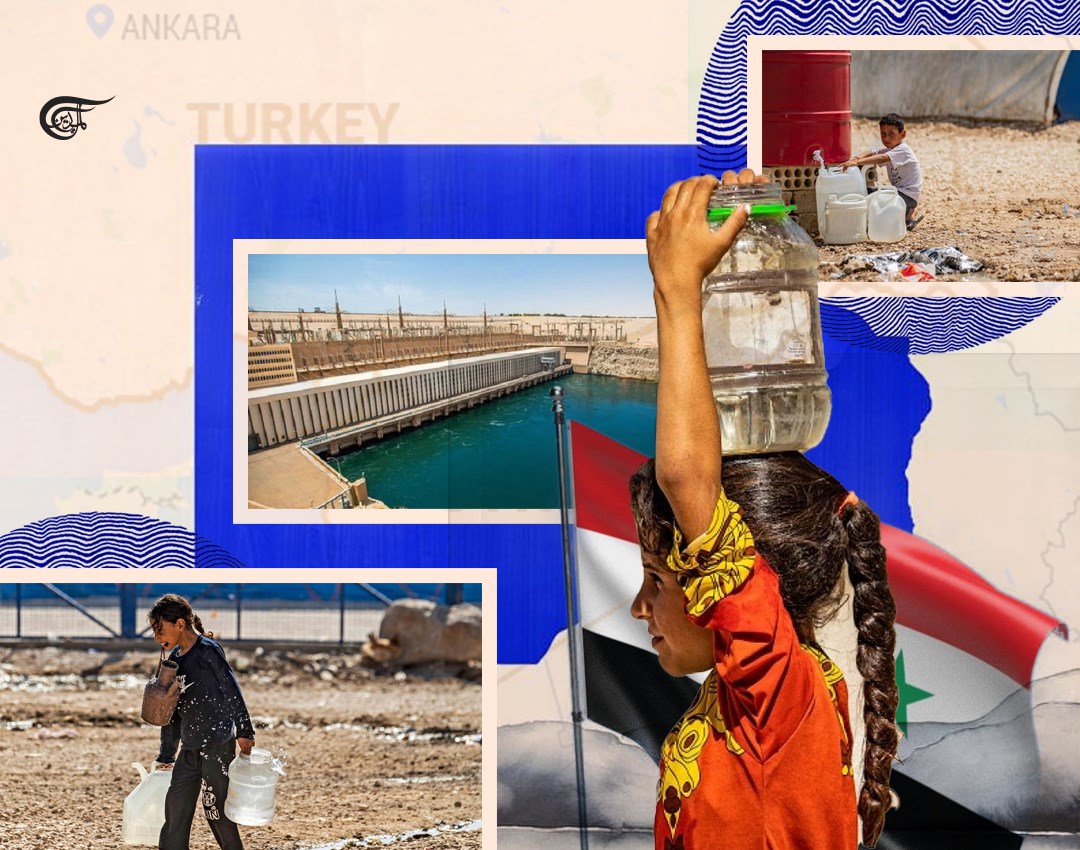For the fifth year in a row, Turkey continues to cut off water to Al-Hasakah
Like many residents, Umm Khalaf no longer cares about whether the water is safe to drink or whether it is salty from the local wells that some dug in front of their homes in the city.
For the fifth year in a row, Turkey continues to cut off water to the Alouk station, which is the only and main source that supplies water to the million Syrian citizens living in the city of Al-Hasakah.
At a time when the summer temperatures in Al-Hasakah reach more than 44 degrees Celsius, hospitals receive daily more than 50 cases of cholera, intestinal infections, and measles due to lack of water.
Cutting off water to citizens is a war crime and a crime against humanity under international humanitarian law, including the Geneva Conventions relating to the status of civilians in wartime, but the UN's disregard for what is happening is the master of the situation.
Collective punishment against the people of Al-Hasakah
Since October 2019, the water pumping from Alouk station, which is controlled by the Turkish army and its loyal factions, has been stopped more than forty times.
In addition, the city of Al-Hasakah and its countryside did not receive water for more than a year and a half, except for a total of 60 days, intermittently.
Between March and May of this year, Turkey showed unusual flexibility in this file, by accepting to operate the station, without requiring that areas it occupies, such as Ras Al-Ain and Tal Abyad, be supplied with electricity.
Indeed, the station worked for a while after its maintenance. It was agreed, through UNICEF, to bring in government employees to install devices to regulate electricity at the station, before work ceased at the end of last May, with Turkey returning to its previous state.
This means that Turkish flexibility was a propaganda goal and linked to the Turkish elections only, as the situation clearly changed after Erdogan won a third presidential term.
We know that the water we drink is polluted, but do we allow ourselves to die of thirst?
In a waiting line, Umm Ahmed stands with many men, women, and children, who are carrying dozens of pots and plastic bowls in front of a tank in a street in order to fill them up with water.
"For several years, our concern and our only problem is how to secure water." With this phrase, the forty-year-old woman began her speech to Al Mayadeen English, adding, "My husband, children and I spend half of our day searching for water. We spend the other half complaining and suffering from back pain as a result of having to carry large buckets to transport water. I neglected my kids and housework because of it."
Some organizations put tanks in the neighborhoods and fill them with water periodically so that the residents fill their pots and then transport them to their homes.
However, these tanks are witnessing cases of great congestion, and the water runs out quickly, so many cannot get their share. This forces them to resort to buying water of unknown origin from owners of private tankers.
One example is Umm Khalaf, who told Al Mayadeen English, "We need about 200,000 Syrian pounds per month, which is equivalent to 20 dollars, to buy water. My husband is a day laborer who can barely cover the expenses of the house, but when we don't have money, which often happens, we turn to our neighbors who own wells."
Like many residents, the fifty-year-old woman no longer cares about whether the water is safe to drink or whether it is salty from the local wells that some dug in front of their homes in the city. She explained to us, "We are forced to drink this water and use it to wash clothes and take a shower... I know that we are risking our lives… Many of those around us have contracted cholera… But there is no other solution. Should we die of thirst?"
Mahmoud Omar watches the machine digging a well near his house, worried that no water will come out.
Two years ago, the sixty-year-old man dug a well and used its water until it dried up a month ago, leaving him facing a great challenge amid difficult financial conditions.
In this context, he said to Al Mayadeen English, "Owning a well relieved me of heavy monthly financial burdens, but now the wells have dried up to a large extent due to the lack of rain and drought, in addition to random drilling and the lack of distances between wells, as the distance between some of them does not exceed ten meters... Since the start of the water crisis, residents have been forced to dig wells in a random way to secure water and reduce the huge financial burdens."
Despite doctors' warnings that the water from the wells is not fit for drinking and even for domestic uses, because it contains germs and a high percentage of nitrate and ammonium ions, which are carcinogenic, however, the residents have no other alternatives to alleviate the burdens imposed on them in light of the insufficient water in the reservoirs scattered in the neighborhoods.
And Mahmoud Omar continued his speech: "Previously, we noticed the presence of water after the drilling reached a depth of 30 meters, as for now, we are currently digging more than 60 meters to find water, and if we do find it, it is drying up after months of use".
With much sadness and anger at what the conditions in Al-Hasakah have become, the retired engineer concluded, "I am tired of the quarrels that occur when the population gathers around the reservoirs and cisterns as a result of the urgent need for water.”

 Sara Salloum
Sara Salloum
 6 Min Read
6 Min Read












